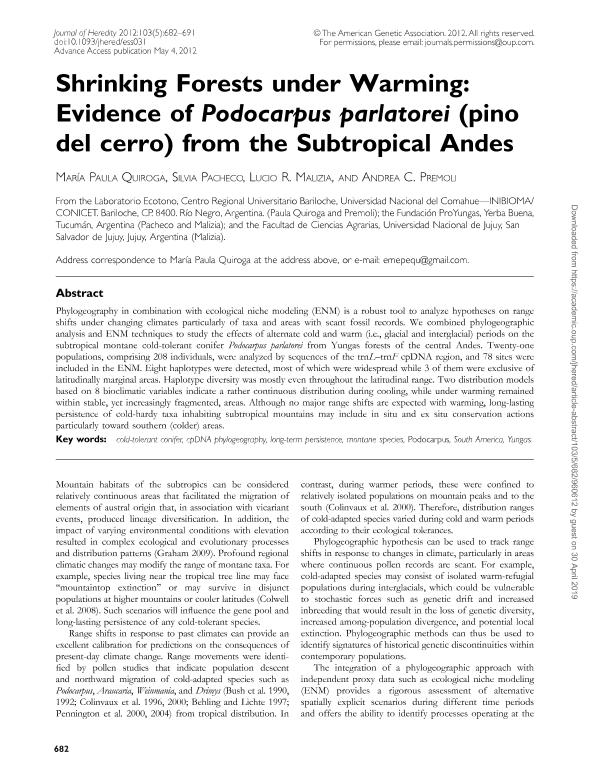Artículo
Shrinking forests under warming: Evidence of Podocarpus parlatorei (pino del cerro) from the subtropical andes
Quiroga, Maria Paula ; Pacheco, Silvia Elena
; Pacheco, Silvia Elena ; Malizia, Lucio Ricardo; Premoli Il'grande, Andrea Cecilia
; Malizia, Lucio Ricardo; Premoli Il'grande, Andrea Cecilia
 ; Pacheco, Silvia Elena
; Pacheco, Silvia Elena ; Malizia, Lucio Ricardo; Premoli Il'grande, Andrea Cecilia
; Malizia, Lucio Ricardo; Premoli Il'grande, Andrea Cecilia
Fecha de publicación:
05/2012
Editorial:
Oxford University Press
Revista:
Journal of Heredity
ISSN:
0022-1503
Idioma:
Inglés
Tipo de recurso:
Artículo publicado
Clasificación temática:
Resumen
Phylogeography in combination with ecological niche modeling (ENM) is a robust tool to analyze hypotheses on range shifts under changing climates particularly of taxa and areas with scant fossil records. We combined phylogeographic analysis and ENM techniques to study the effects of alternate cold and warm (i.e., glacial and interglacial) periods on the subtropical montane cold-tolerant conifer Podocarpus parlatorei from Yungas forests of the central Andes. Twenty-one populations, comprising 208 individuals, were analyzed by sequences of the trnL-trnF cpDNA region, and 78 sites were included in the ENM. Eight haplotypes were detected, most of which were widespread while 3 of them were exclusive of latitudinally marginal areas. Haplotype diversity was mostly even throughout the latitudinal range. Two distribution models based on 8 bioclimatic variables indicate a rather continuous distribution during cooling, while under warming remained within stable, yet increasingly fragmented, areas. Although no major range shifts are expected with warming, long-lasting persistence of cold-hardy taxa inhabiting subtropical mountains may include in situ and ex situ conservation actions particularly toward southern (colder) areas.
Archivos asociados
Licencia
Identificadores
Colecciones
Articulos(INIBIOMA)
Articulos de INST. DE INVEST.EN BIODIVERSIDAD Y MEDIOAMBIENTE
Articulos de INST. DE INVEST.EN BIODIVERSIDAD Y MEDIOAMBIENTE
Citación
Quiroga, Maria Paula; Pacheco, Silvia Elena; Malizia, Lucio Ricardo; Premoli Il'grande, Andrea Cecilia; Shrinking forests under warming: Evidence of Podocarpus parlatorei (pino del cerro) from the subtropical andes; Oxford University Press; Journal of Heredity; 103; 5; 5-2012; 682-691
Compartir
Altmétricas



